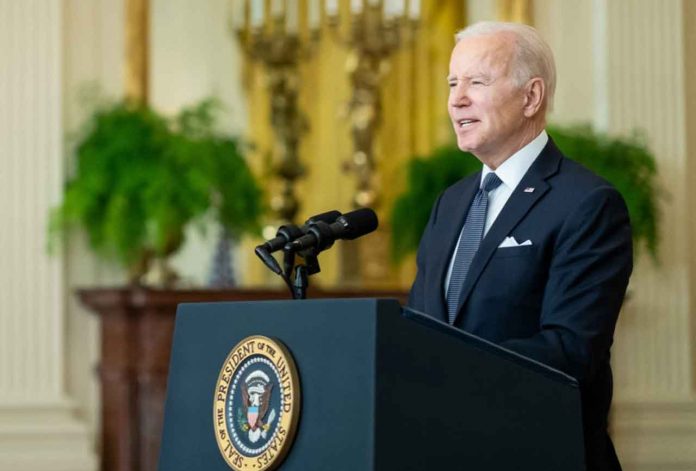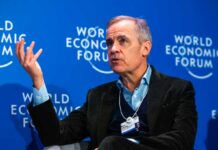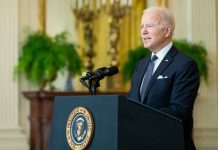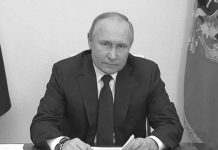A strong NATO is crucial to U.S. and global security, President Joe Biden said today as he concluded the three-day summit marking the 75th anniversary of the alliance in Washington.
The 32-member bloc stands as the “most important military defense alliance” in the history of the world, the president said as he emphasized the United States’ commitment to its global partners amid renewed challenges in Europe and beyond.
“For those who thought NATO’s time had passed, they got a rude awakening when Putin invaded Ukraine,” Biden said in a news conference capping the summit. “Some of the oldest, deepest fears in Europe roared backed to life because once again a murderous madman was on the march.
“But this time, no one cowered in appeasement, especially the United States,” he said.
Global partners have rallied in opposition to Russia’s war and continue to serve as a testament to the power of alliances, Biden said as he underscored the imperative for the United States’ continued leadership.
“We’re the United States of America,” he said. “We are the indispensable nation. Our leadership matters. Our partnerships matter. This moment matters. We must rise to meet it.”
The president’s remarks echo the resolve among NATO leaders at this week’s summit where member states advanced a range of initiatives to further strengthen the alliance and take steps to advance the support of Ukraine’s defense against Russian aggression.
Outcomes from this year’s summit include a pledge from all 32 allies to increase defense industrial production and to coordinate with fellow NATO countries on national plans to strengthen industrial capacity.
The allies also agreed to advance NATO’s modernized command structure and put a new generation of defense plans into practice.
The plans, which were agreed to at last year’s summit in Vilnius, Lithuania, are the first comprehensive defense blueprint developed by the alliance since the end of the Cold War.
They include an updated force structure to strengthen NATO’s ability to respond to any scenario and across all domains.
The leaders also announced significant steps to further support Ukraine’s defense against Russian aggression, as well as Ukraine’s long-term bridge to membership in the alliance.
On Tuesday, Biden announced that the U.S., Netherlands, Germany, Italy and Romania will provide Ukraine with five additional strategic air defense systems to help protect Ukrainian civilians, cities and soldiers.
Today, Biden met with Ukrainian President Volodymyr Zelenskyy during the summit.
The two leaders discussed the situation on Ukraine’s front lines and the ongoing efforts of the United States to support Ukraine’s defenders, according to a White House summary of the meeting.
Following their meeting, Biden announced additional security assistance valued at up to $225 million to meet Ukraine’s urgent needs.
Biden also announced on Thursday the endorsement of the Ukraine Compact by more than 20 countries, together with the European Council and European Union, by which signatories affirm their commitment to Ukraine’s long-term defense and security.
“What happens to Ukraine matters,” Biden said in announcing the compact on Thursday. “It matters to all of Europe. It matters to NATO. Quite frankly, matters to the whole world.
“We’re united against Putin’s senseless brutal war,” he said. “We are united behind Ukraine as it fights to defend its freedom and its future.”
Earlier during the summit, NATO leaders also announced the standup of the NATO Security Assistance and Training for Ukraine, or NSATU, initiative which will coordinate equipment, training and force development for Ukraine as it advances on its path to full interoperability with NATO.
The effort will be based in Germany and carried out in countries throughout the alliance.
NATO Secretary General Jens Stoltenberg said the steps further pave Ukraine’s path to joining to the alliance.
“The work we are doing together now will ensure that when the time is right, Ukraine can join without delay,” Stoltenberg said in a news conference on Wednesday. “It is not a question of if, but when.”
The allies have also pledged to expand partnerships with key allies in the Indo-Pacific. This year’s summit includes high-level meetings with key partners in the region, including Australia, Japan, New Zealand and South Korea.
On Thursday, Biden met with his regional counterparts on the margins of the summit where he welcomed the contribution of NATO’s Indo-Pacific partners to global security including their support for Ukraine.
The leaders also discussed their shared concern over China’s support of Russia’s defense industrial base, according to a White House summary of the meetings.
During Biden’s meeting with South Korean President Yoon Suk Yeol, the two leaders also discussed advancements on U.S.-South Korean security cooperation and extended deterrence outlined under the April 2023 Washington Declaration to mark the 70th anniversary of the U.S.-ROK alliance and recommit to develop an ever-stronger mutual defense relationship.
As part of the Washington Declaration, the two countries established a Nuclear Consultative Group, or NCG, to strengthen extended deterrence, discuss nuclear and strategic planning and manage the threats posed by North Korea.
The two countries’ NCG co-chairs — U.S. Acting Assistant Secretary of Defense for Space Policy Vipin Narang and South Korean Deputy Minister of National Defense Policy Dr. Cho Chang Lae — met at the Pentagon on Thursday to sign joint guidelinesoutlining principles and procedures for maintaining an effective nuclear deterrence policy and posture.
Biden and Yoon praised the NCG’s accomplishments during their meeting, according to a White House summary The two leaders also reiterated the need to continue making progress together on nuclear consultation and strategic planning.







